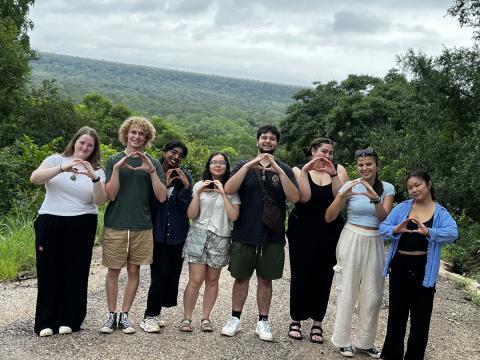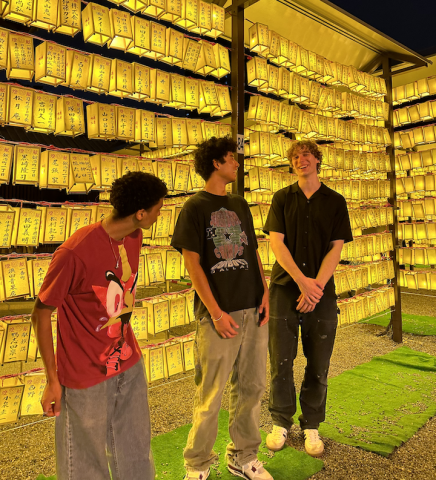
Parent and Family Resources
GEO recognizes that parents and families play a key role in a student's decision, and ability to go abroad. This guide is meant to help families find the information they need to support their student's study abroad journey.
Global Education Oregon (GEO) offers 200+ study, intern, and exchange programs in more than 60 countries. The type of global experience your student is looking for is possible with GEO. From GEO Center programs to full-time internships to exchange programs, there is a program for every student from every major. Explore GEO's interactive program map to explore programs and countries.
Why Should Your Student Study Abroad?
- Enrich their academic experience with a language immersion experience, classes taught at a highly regarded international university, international research opportunities, or specialized courses taught abroad by UO faculty members
- Earn professional credentials through internships or service-learning opportunities to improve career readiness
- Learn to adapt to unique challenges while honing interpersonal and intercultural communication skills
- Gain independence, self-awareness and confidence by living in another culture

Finances
Billing and Finances
Studying abroad is a significant financial commitment, which is why every program page has price and budget information. All students are encouraged to become familiar with their program’s budget and with GEO financial policies before committing to a program.
UO students are billed for their study abroad program through DuckWeb. If their program is through a third-party provider, they will be billed directly by that provider.
Learn More About GEO's Billing Information
Financial Aid and Scholarships
Most forms of financial aid and scholarships can be applied to the cost of study abroad. Explore the links below to find more information on financial aid, GEO scholarships, and other funding opportunities.

Health and Safety
Emergency Response
Student safety and security is GEO’s number one priority. GEO has an emergency response protocol at all program locations. In the event of an emergency, students should do the following:
- Contact local emergency services (police, medical providers, etc.). Use the 911 equivalent.
- Contact on-site staff (this information is provided to students before they depart).
- Contact Eugene-based GEO staff.
As a reminder, emergency services and staff on-site are best able to assist students in a crisis. Non-emergencies such as luggage not arriving, passport being stolen, or other non-life-threatening incidents can wait until regular business hours.
Emergency Phone Lines
GEO offers a 24/7 answering service in the event of an emergency. If students are unable to reach on-site staff in an emergency, they are encouraged to call the GEO emergency phone. To receive immediate assistance, students should call the GEO emergency line before a parent or guardian.
- After-hours Emergency Line: 503-764-4146
- All non-emergency inquires: 541-346-3207
Learn More About Emergency Responses
International Insurance
The UO provides international accident and sickness insurance to students participating in most GEO programs. The plan covers most accidents and illnesses that may occur abroad but does not cover high-risk activities. It also functions as a reimbursement-based insurance plan. Students participating in some third-party programs (CIEE, USAC, DIS, and IE3) will not be enrolled in the UO’s international insurance plan but rather with insurance provided by those organizations.
Mental Health and Wellness
If students are currently seeing a doctor or counselor, or they anticipate needing to meet with a healthcare professional abroad, they should meet with their primary healthcare provider to create a care plan.
See the Self-Health Evaluation
Mental Health Resources
Studying abroad can lead to a high level of stress and anxiety. Students have access to a variety of resources to support their mental health abroad.
- TELUS Mental Health App
- UO Counseling Services
- Students can also work with the UO international insurance plan to meet with an in-person provider on site.

Communication
- Students receive guidance about mobile phone options during both pre-departure orientation and upon arrival, in most cases. See more details under the student mobile phone policy in the Student Guide.
- The ability to receive mail depends on the program. Students are provided with their mailing information in their orientation materials. Parents and families should ask their student for the proper address of where to send any care packages.
FERPA
- Due to the Family Educational Rights and Privacy Act (FERPA), GEO program coordinators are not able to provide parents & families with specific information about their student(s). This includes confirming if a student is participating in a program.
- Students can sign a FERPA waiver that lets GEO program coordinators know explicitly what they can speak with parents or guardians about (billing, program details, etc.)
- If there is imminent risk to a student’s health and safety abroad, GEO will contact the emergency contact the student listed in their GEO portal.
- GEO does not provide any information directly to parents. All students participating in a GEO study abroad program will take part in a pre-departure orientation that covers health and safety guidelines and program/location-specific information.
